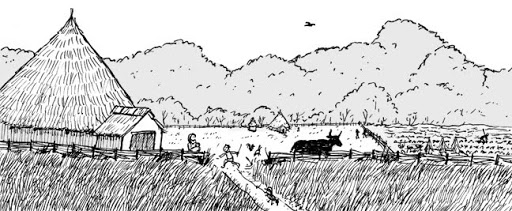Six years ago when my my wife first approached me with the idea that we should stop eating wheat I was incredulous. “But, society was built on grains!” was my response. I thought back to my history lessons of the Egyptian and Mesopotamian civilizations as a defense for eating wheat. If it weren’t for the domestication of ancient grains, I thought, we’d still be wandering as hunter gatherers. It’s true that the ancients’ cultivation of grains allowed for the amount of food necessary to support a large society. However, my interest in archaeology has revealed that the grain and dairy consumption of our ancestors is drastically different than modern eating habits.
While my wife has an interest in modern cooking, my hobby includes the study of Iron Age, Romano, and Saxon agriculture. My research focuses on ancient Britain (partly because the relevant literature is written in English), but parallels could be found in other ancient societies. My first couple posts on this subject will look at gluten and casein in ancient foods. If there is interest, I’ll expand to general info on ancient cooking, farming, etc.
Ancient Grains : Wheat
 Emmer Wheat (Triticum dioccum)
Emmer Wheat (Triticum dioccum)
Spelt (Triticum spelta)
Conclusion
References
1. Abdel-Aal, Elsayed. Specialty Grains for Food and Feed Published by the American Association of Cereal Chemists. 2005.
2. Alcock, Joan P. Food in Roman Britain
3. Cool, H.E.M. Eating and Drinking in Roman Britain.
4. Hagen, Ann. Anglo-Saxon Food & Drink. Anglo Saxon Books, 2006.
5. Ness, Stan. “Types of Wheat: Nutritional Content & Health Benefits Comparison” on Einkorn.com. 2010.
6. Pizzuti, Daniella, et al. “Lack of intestinal mucosal toxicity of Triticum monococcum in celiac disease patients” in the Scandinavian Journal of Gastroenterology Volume 41, Issue 11 November 2006 , pages 1305 – 1311.



Emily says
thank you so much for writing this. i had only heard, anecdotaly that modern wheat is higher in gluten, i love seeing some of the facts here.
Lori says
I found your post very interesting. Thank you for taking the time to put it together.
Penny says
Great info! That answered so many questions that I had about wheat. Thank you.
Penny
The Mom says
Thank you! I’ve only recently started avoiding wheat, and am finding it difficult to change my thinking. I was raised on fresh ground whole wheat, understanding that it was very good for us. Now, I’m learning it’s not quite as good as I thought…and that’s hard to comprehend sometimes. But this really helped!! Thank you!!! I plan to pass it on to a few other people that are struggling with the same things I’m working through.
Anonymous says
Thank you for this interesting essay. I would love to read more.
Michelle H
Andrew says
I’m glad you all found the piece interesting. At parties when I tell people that I study ancient agriculture as a hobby, they just don’t know what to say. It must sound so boring. But, it’s cool right? My next article is about Celts, Romans and dairy.
Kelli says
Andrew & Kelly,
This is VERY interesting to me. I always wonder how we used to eat, because we are so far removed from it. I would like to read more about this, but I am hesitant to read anything that hints of evolution (verses creation, I am refering to the 10,000 B.C. reference) because that makes me question the validity of everything else, believing that the world is around 6,000 years old.
I have Sue Gregg’s cookcooks, and in Whole Grain Baking there is a lot of Bible references and information on grains, also very interesting.
Andrew says
Hi Kelli,
The Iron Age, Roman, and Saxon food books I reference only deal with the 100s BC to the 800s AD. There is some discussion of farmers breeding livestock, but they don’t get into evolution. So, these books should appeal to everyone.
Stella says
This is such an interesting article. I have always felt that too much forced breeding and genetic modification of wheat is the cause of intolerance in many people today. I can’t imagine it was too much of a problem with more ancient grains. I think this expands to all foods really. I mean, come on, fish DNA is tomatoes (over 90% of conventional have it these days)!
Anyway, very good article!
Aubree Cherie says
This is so fascinating! I really enjoyed reading about the history of wheat. I love history in itself and being gluten intolerant really made this applicable!
I’m looking forward to your next article with dairy! (I think you should definitely continue to enlighten us on food of the past!!!)
Thanks! ~Aubree Cherie
S Post says
Love Love Love the Post. Definitely interested in reading more. Keep it coming!
Anonymous says
This is fantastic, Andrew! An incredible addition to a wonderful blog. I am a major food/language/culture nerd, and as a health coach I often have to answer that difficult question: why is gluten so bad for us now? This is really scratching me where I intellectually itch. I will read anything you write – bring on the food history! – Tina in Michigan
Leah says
Thank you for such an informative post! I learned a lot in just a few minutes. I’m glad you did all the legwork so I could enjoy it!